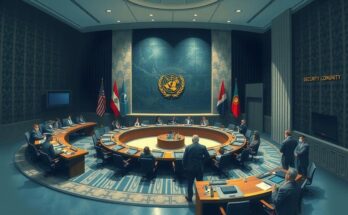UN human rights chief Volker Türk expressed grave concerns about the escalating violence in eastern DRC, citing nearly 3,000 deaths linked to the M23 group’s offensives since January. The situation has drawn attention from the UN Human Rights Council, which is considering a fact-finding mission. Both local officials and UN representatives have highlighted the urgent humanitarian crisis and the continued fallout from external military support, particularly from Rwanda.
In a recent address, UN human rights chief Volker Türk conveyed serious apprehension regarding the violent escalation in eastern Democratic Republic of the Congo (DRC), intensified by the ongoing M23 offensive, allegedly backed by Rwanda. He warned, “If nothing is done, the worst may be yet to come, for the people of the eastern DRC, but also beyond the country’s borders.” Since late January, nearly 3,000 individuals have been killed and thousands more injured due to relentless attacks by the M23 group.
The conflict has led to significant hostilities in the resource-rich regions of North Kivu and South Kivu, with a considerable number of civilians displaced from their homes. The situation escalated substantially when M23, composed mainly of Tutsi fighters, captured key areas in North Kivu, moving toward the city of Bukavu. The UN Human Rights Council is considering a fact-finding mission to examine the severe human rights violations reported in these provinces.
In a troubling development, Turkish noted severe attacks on civilian infrastructure, including hospitals, which have resulted in numerous casualties. He cited a specific incident where two hospitals in Goma were bombarded, leading to injuries among patients, including women and children. Furthermore, a mass prison break at Muzenze Prison saw multiple violent crimes, including assaults against female inmates, heightening concerns over widespread sexual and gender-based violence in the ongoing conflict.
Bintou Keita, the chief of MONUSCO, corroborated these grim findings, stating that the situation in Goma is catastrophic as bodies remain in the streets due to M23 control. She enumerated alarming issues such as forced recruitments of youth and threats to human rights defenders, urging immediate humanitarian access to affected areas. Keita also highlighted significant public health risks arising from the conflict, including disease outbreaks and the disruption of education, which further exacerbate the humanitarian crisis.
Patrick Muyaya Katembwe, the DRC’s Minister of Communications, condemned the ongoing support provided to armed groups by neighboring countries, particularly Rwanda. He asserted that this external support has intensified violence in the DRC for decades, adversely impacting the governance and exploitation of the nation’s mineral resources. However, Rwandan representative Ambassador James Ngango refuted these claims, asserting that a significant military threat against Rwanda is imminent.
Mr. Türk emphasized that the international community must acknowledge its role in the crisis, stating, “The population in the eastern DRC is suffering terribly, while many of the products we consume or use, such as mobile phones, are created using minerals from the east of the country. We are all implicated.” This calls for a collective response to address the ongoing humanitarian needs and foster peace in the region.
The Democratic Republic of the Congo (DRC) has been mired in conflict for decades, heavily influenced by the extensive presence of armed groups and external interventions. The M23 group, primarily composed of Tutsi fighters, has intensified its military operations in eastern DRC, leading to significant violence and displacement. The region’s rich mineral resources have been a focal point of ongoing tensions, drawing international attention and raising serious concerns regarding human rights abuses and humanitarian needs.
Recent statements by UN officials underscore the urgency of addressing the escalating violence in eastern DR Congo, exacerbated by foreign military influences. As hostilities persist, the humanitarian situation continues to deteriorate, prompting calls for international intervention and support for affected populations. Understanding the complex root causes of this conflict is crucial for developing effective solutions and ensuring accountability for human rights violations.
Original Source: news.un.org




